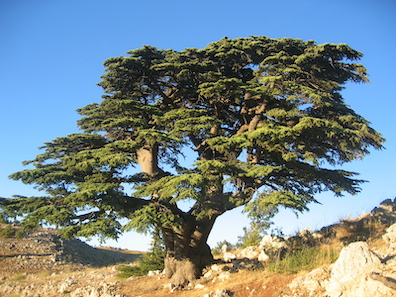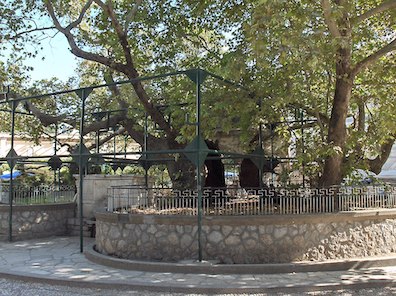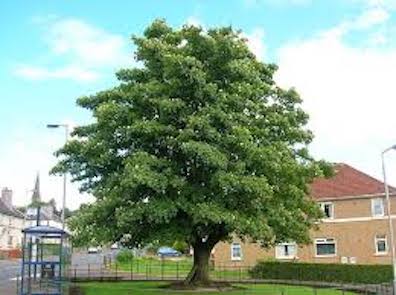Ecclesiasticus, a
2nd century BCE collection of ethical writings omitted from the
Hebrew Bible but deemed canonical by Catholics, compares Wisdom
to valuable trees. Joyce knew this passage in the Latin of the
Vulgate Bible. In part 3 of
A Portrait of the Artist,
Stephen recalls verses 24.17-20:
Quasi cedrus exaltata sum in Libanon et quasi
cupressus in monte Sion. Quasi palma exaltata sum in Gades
et quasi plantatio rosae in Jericho. Quasi uliva speciosa in
campis et quasi platanus exaltata sum juxta aquam in
plateis. Sicut cinnamomum et balsamum aromatizans odorem
dedi et quasi myrrha electa dedi suavitatem odoris.
The Douay-Rheims Bible, translated from the Vulgate and
published in 1582 and 1609-10 to counter Protestant
translations, gives an English version:
And I took root in an
honourable people, and in the portion of my God his
inheritance, and my abode is in the full assembly of saints.
I was exalted like a cedar in
Libanus, and as a cypress tree on mount Sion.
I was exalted like a palm tree in
Cades, and as a rose plant in Jericho:
As a fair olive tree in the plains,
and as a plane tree by the water in the streets, was I
exalted.
I gave a sweet smell like cinnamon.
and aromatical balm: I yielded a sweet odour like the best
myrrh:
And I perfumed my dwelling as storax,
and galbanum, and onyx, and aloes, and as the frankincense not
cut, and my odour is as the purest balm.
I have stretched out my branches as
the turpentine tree, and my branches are of honour and grace.
As the vine I have brought forth a
pleasant odour: and my flowers are the fruit of honour and
riches (24.16-23).
The
Cyclops parody selects two tall trees from this
array of precious plants.
Cedrus libani, the famous "
Lebanonian
cedar," is a majestic conifer of the eastern Mediterranean
that does not grow anywhere near Ireland. According to the
Hebrew Bible its valuable wood was used to construct the Temple
in Jerusalem (reflected by association with the "cypress tree on
mount Sion"), and today it is an enduring emblem of Lebanon,
featured on the nation's flag. The "
planetree,"
Platanus
orientalis, is a longlived riverine tree which grows in
southeastern Europe as far west as the Balkans, and in
southwestern Asia as far east as Iran. Greeks and Persians have
long planted them in urban settings near water sources, a fact
the writer of Ecclesiasticus knows: "a plane tree by the water
in the streets."
Farther still from anything Irish is the "
eugenic eucalyptus."
Eucalyptus species are native to southeast Australia and
Tasmania. Joyce apparently included them because the biblical
list focuses on pleasing and medicinal aromas: "cinnamon,"
"aromatical balm," "myrrh," "perfume," "balm," "turpentine,"
"odour." Eucalyptus leaves are intensely aromatic, and their
oils have antiseptic uses. Gifford notes that the plant is
"eugenic" because "a tincture made from opium, cinnamon, and
kino, an exudation of the eucalyptus, was widely used as a
douche in the early twentieth century."
Of the four trees, only the "
sycamore" grows in Ireland,
and even here qualifications and uncertainties abound. The name
usually refers to
Platanus occidentalis,
a north American tree of the same genus as the plane tree, and
it is often applied to the London plane tree, a hybrid of the
two
Platanus species which began life when plant hunters
brought both to England, probably in the 17th century, and which
became a brilliantly successful London street tree. Trees called
sycamores were imported into Ireland from continental Europe at
about the same time to provide shade on estates and they spread
widely, but these trees are actually maples:
Acer
pseudoplatanus, or "false-plane maple." The Latin species
name may reflect the fact that London plane trees have leaves
that look a lot like maple leaves, and the common name may
reflect the fact that Irish landowners thought they were
importing trees similar to London's sycamores.
Joyce thus includes one tree endemic but not native to
Ireland in a list that contains two Mideastern trees
celebrated in the Bible and one Australian tree whose odors
evoke biblical balsams, all of them in the service of singing
the praises of Ireland's "arboreal world." This is strange
stuff—patriotic grandeur that deliberately undoes itself by
mongrel excess. Readers will find that the mad method becomes
a fixture of Cyclops. The "hero" of the next parody is
associated with a vast panoply of Irish mythological figures
whose number includes Goliath, Christopher Columbus, and
Patrick W. Shakespeare.



